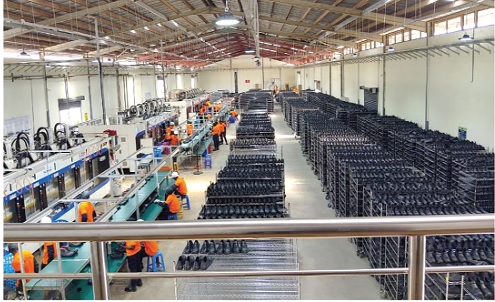
The man committed to solving social problems
One man, Dr Kojo Benjamin Taylor, a Ghanaian businessman, who has chosen to remain unknown and unsung, has decided to break into the uncharted waters of social entrepreneurship to give it real meaning.
A social entrepreneur is an investor who decides to put his money into any investment that has the potential to solve community-based problems. These individuals are willing to take on the risk and effort to create positive changes in society through their initiatives.
Their work has been recognised in some studies which show that social entrepreneurship is the way to go if the United Nations’ Sustainable Development Goals (SDGs) are to be achieved.
In a study, “The role of social entrepreneurship in the attainment of the sustainable development goals”, published in the Journal of Business Research, the authors said, “Despite the efforts undertaken by the United Nations to engage all public and private actors towards the achievement of the 2030 Agenda, the contribution of traditional businesses has been proved to be insufficient so far.”
Thus, Dr Taylor’s decision to become a social entrepreneur is worthy of emulation by those who want to contribute to achieving the SDGs and beyond as traditional businesses alone, cannot meet the needs of the world we live in today.
Social national health care
After his sojourn in the United States (US), he moved back to Ghana in 2011 with his social national healthcare initiative through Sanford Health.
One out of eight siblings, Dr Taylor started his journey into business in the US when he founded a technology services company and built that company into a $70 million franchised organisation with 300 employees in 15 US cities. The company was later sold to a division of IDG Inc. (Publishers of “Books For Dummies”)
With a successful business career in America, he is burning with the desire to look for sectors of opportunity to apply his business skills while helping to solve a social need of the country. Realising the inequitable access to health care in the rural and peri-urban areas of Ghana, he ventured into health care, to help improve access to quality health care.
His quest to help provide solutions to social problems saw him collaborating with the Ministry of Health to set up a public-private partnership that saw Sanford Health managing 24 clinics across Ghana, thereby improving access to quality health care in urban and rural communities around the country, all with NHIS accreditation, to make affordable health care easily accessible.
Asked what motivated him to give up an affluent lifestyle in the US and move to Ghana, Dr Taylor said, “I came to Ghana with a desire to become a social entrepreneur, leveraging my business skills to alleviate systemic social problems of the country and help create economic vitality in Ghana and Africa.”
As a Board Emeritus of Educate Tanzania Incorporated (ETI), he supported the efforts of co-founders, Jan B. Hanson and Stephen Hanson, to establish KARUCO College in Karagwe.
ETI currently partners developing communities in Tanzania to promote and sustain social and economic prosperity through education. ETI has since erected a Solar Array to provide power to KARUCO College and provided Micro-Enterprise Loans to jump-start businesses.
Factory
Recently, he partnered World Shoe Inc, and as a co-founder of World Shoe Limited, established World Shoe Factory at Akosombo to provide Ethylene Vinyl Acetate (EVA) shoes to help prevent contracting diseases like hookworm, one of the Neglected Tropical Diseases (NTDs).
EVA is a foam-like material created by mixing plastic-type substances ethylene and vinyl acetate. Vinyl acetate makes up between 10 and 40 per cent of EVA, the remainder being ethylene.
Through the factory in Akosombo, Dr Taylor and World Shoe have created jobs with a factory that runs three shifts and produces 8,000 shoes a day, while maintaining 80 per cent of its workforce from Akosombo and its environment.
Dr Taylor is using the factory to tap into the $777 million that countries and global donors have pledged to the non-governmental organisation, Reaching the Last Mile, to help defeat NTDs.
In addition, he is optimistic that World Shoe’s products will reach areas where walking barefoot on soil contaminated by faeces is the cause of contracting hookworm.
“More than half a billion people around the world do not have reliable access to quality footwear, leaving them vulnerable to injury and diseases that perpetuate a cycle of poverty,” he added.
“We believe the new World Shoe factory will demonstrate how African innovation can propel African development and create change on a global scale.
By creating a model to provide people with affordable, high-quality, eco-friendly shoes, we can support education, health and economic outcomes while protecting the environment,” he added.
Dr Taylor said World Shoe Limited was thinking beyond creating a footwear industry in Ghana. The company wants to create a business enclave at Akosombo around health care, technology and other manufacturing industries that benefit from the synergy through foreign joint ventures.
“The goal is to replicate the model in other African countries to help change the African narrative of poverty, to employment and wealth creation,” said Dr Taylor.
-------------------
System Summary
The article "The Man Committed to Solving Social Problems" focuses on the impactful work of an individual who has dedicated their life to addressing and solving a variety of social challenges in Ghana.
It provides specific examples of their work and the positive outcomes achieved, demonstrating the tangible benefits their efforts have brought to the community.
Challenges faced by the individual are also discussed, including financial constraints, logistical hurdles, and resistance from various stakeholders.
Looking ahead, the article explores the individual's future plans and long-term vision. It outlines ongoing and upcoming projects, as well as their aspirations for expanding their impact and addressing new social issues. The individual’s commitment to fostering systemic change and scaling their efforts is emphasized, reflecting their dedication to making a lasting difference.
